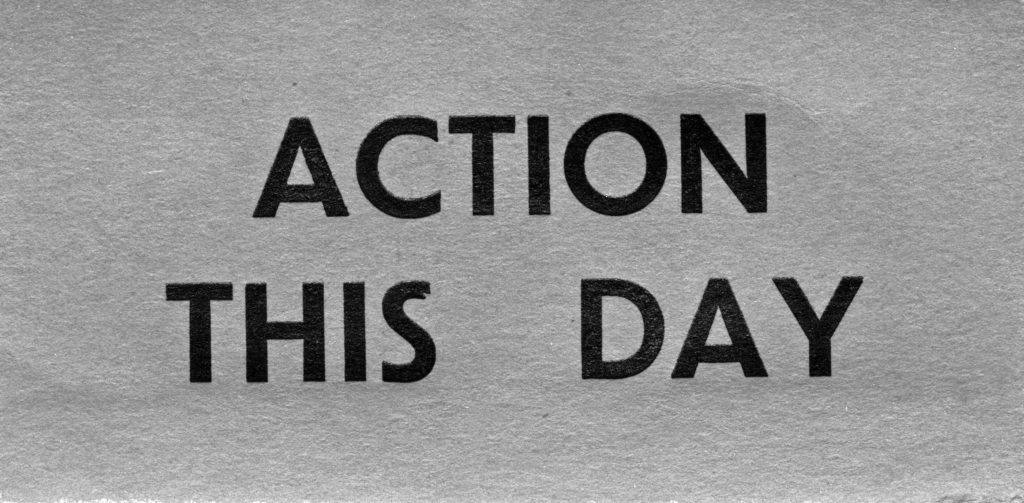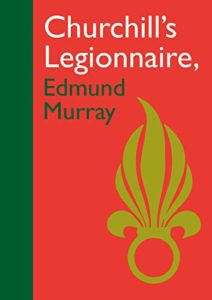
Finest Hour 194
Action This Day – Autumn 1896, 1921, 1946

August 7, 2022
Finest Hour 194, Fourth Quarter 2021
Page 42
By Michael McMenamin
125 Years Ago
Autumn 1896 • Age 22
“This Godless Land of Snobs and Bores”
Churchill’s feeling of isolation as a subaltern in India and his desire to receive letters from England are apparent in a letter to his mother: “You can’t think with what pleasure and excitement I look forward to the mail. Do persuade people to write. Aunt Clara, who writes such good letters or Aunt Leonie…stimulate Jack and above all write yourself long, long, letters. Every word is thoroughly appreciated out here— in this godless land of snobs and bores.”
Happily for Churchill, he received letters from Bourke Cockran, his Irish-American friend and mentor in New York City, who, despite being a Democrat, had successfully campaigned for Republican William McKinley in that year’s presidential election. Churchill wrote back to Cockran: “My Indian experiences have now lasted for over a month. Our voyage out was pleasant and prosperous— though of course in the Red Sea the heat was excessive. Bangalore— which is my permanent address while in this country—possesses a beautiful climate and is for many other reasons an agreeable place to live in. This country would fascinate you. Indeed I imagine no more interesting experience than for an American to visit India. A more amazing contrast than that between the United States and this country—passes the wit of man to devise. I give you an invitation to come. My house is large and there is ample room for visitors….”
Churchill continued in his letter to Cockran: “I am staying here for the polo tournament, which we now stand a good chance of winning. Ten miles away is the independent city of Hyderabad containing nearly 300,000 inhabitants and all the scoundrels in Asia. Alone among Indian Princes the Nizam has preserved by his loyalty in former days his internal independence and the consequence is that the natives assume a truculent air and all carry arms. Hence the presence of the 19th Hussars—whose guest I am—and who with nearly 14,000 European and native soldiers are assembled here in the great camp of Secunderabad to overcome the turbulent city. The spectacle is at least instructive. You must come out here—if only for a flying visit.”
Churchill concluded the letter to Cockran as he had to his mother, asking for more letters: “P.S. I cannot tell you how much letters are appreciated out here—so do write.”

2025 International Churchill Conference
100 Years Ago
Autumn 1921 • Age 47
“Collins Rose, Looking as if He Was Going to Shoot Someone”
As Secretary of State for the Colonies, Churchill had his hands full. A good three years after the end of the First World War, violence continued in Iraq and Palestine, sabotaging Churchill’s plans to reduce the number of British forces stationed there. The troubles of the Middle East, however, were not Churchill’s primary concern. Stagnation of the British economy demanded government austerity. Churchill told his advisers that everything in the Middle East—including Arab riots against the Jews of Palestine—was “secondary to reduction in expense.”
Ireland was a different story. Even though as Colonial Secretary he had no responsibility for the guerrilla war being waged there by Sinn Fein’s military arm, the Irish Republican Army (IRA), Churchill long had been the Liberal Party’s chief spokesman on Ireland, from his time at the Admiralty leading up to the Great War. He was also, through 1919 and 1920, the War Minister who created the infamous “Black and Tans” and their indiscriminate reprisals for comparable atrocities by the IRA. Given Churchill’s intimate involvement with Irish matters, it was not surprising that Prime MICHAEL McMENAMIN’S ISSUE NO. 194 | 43 Minister David Lloyd George sought his advice and counsel. Churchill, in turn, received advice and counsel from his wife. In February, shortly after he became Colonial Secretary, Clementine urged him “to use your influence now for some sort of moderation or at any rate justice in Ireland. Put yourself in the place of the Irish. If you were ever leader, you would not be cowed by severity and certainly not by reprisals,…it always makes me unhappy & disappointed when I see you inclined to take for granted that the rough, iron-fisted ‘Hunnish’ way will prevail.”
Clementine’s observation accurately described the policy toward Ireland when Churchill was at the War Office, and her request that he change his approach reflected the stance he would take toward Ireland as Colonial Secretary in 1921. In April, he supported holding elections in both southern Ireland and Ulster even if Sinn Fein candidates would prevail throughout the south. At the same time, he was in a minority in the cabinet for offering a truce with the IRA. After Sinn Fein candidates took 122 of the 126 constituencies in May, Lloyd George came around by July to Churchill’s position about a truce. The IRA accepted, and negotiations began at 10 Downing Street on 11 October. Despite being invited, Eamon de Valera, the self-proclaimed “President” of the Irish Republic, who safely sat out the Anglo-Irish war raising funds in America, refused to attend the negotiations on the grounds that as a head of state he held a higher rank than Lloyd George, who was merely a head of government. Instead, de Valera sent Arthur Griffith, the Acting President of the Dail, and Michael Collins, the leader of the IRA.
The negotiations were contentious and went on throughout that fall. The British were offering full dominion status to southern Ireland, while de Valera wanted an independent Irish Republic, something the British were not prepared to grant. Concessions were made by both sides and, during the negotiations, Churchill earned the trust of Michael Collins. By 5 December, all concessions had been made, and the British delivered an ultimatum: sign the treaty or the truce was over. Griffith said he would sign even if no one else in his delegation did. Michael Collins did the same and, as Churchill wrote in The World Crisis, “Michael Collins rose looking as if he was going to shoot someone, preferably himself. In all my life, I have never seen so much passion and suffering in restraint.” The treaty creating the Irish Free State was signed on 6 December. At Churchill’s suggestion to the Cabinet the next day, all Sinn Fein members convicted of murder and sentenced to death were advised that the death penalty would not be enforced.
75 Years Ago
Autumn 1946 • Age 72
“I’ll Tear Their Bleeding Entrails out of Them”
His wife Clementine’s prediction that the electoral defeat suffered by Churchill’s Conservative Party in 1945 might well be a blessing in disguise was proving prescient. His health had improved; he was hard at work on his wartime memoirs; Life magazine had offered $1,150,000 for the serialization rights to his memoirs in the United States and Houghton Mifflin offered $250,000 for publishing the memoirs in book form in the United States; and he was enjoying his public criticism of the failures of the new Socialist government.
One Churchill critic, Lord Derby, suggested that Churchill only had an interest now “from the point of view of being able to say something which he knows will irritate individuals of the Government, and I am bound to say I think he does that very successfully.” An example of this is his address to the Conservative Party Conference in Blackpool on 3 October, when he attacked both the domestic and foreign policy of the Labour government. Addressing the rationing of bread, Churchill said, “The German U-boats in their worst endeavors never made bread-rationing necessary in war. It took a Socialist Government and Socialist planners to fasten it on us in time of peace when the seas are open and the world harvest good. At no time in the two world wars have our people had so little bread, meat, butter, cheese and fruit to eat.”
On 19 September in Zurich, Churchill had announced his support for “a kind of United States of Europe” and prophetically said, “The first step in the recreation of the European family must be a partnership between France and Germany. In this way only can France recover the moral leadership of Europe. There can be no revival of Europe without a spiritually great France and a spiritually great Germany.”
Subscribe
WANT MORE?
Get the Churchill Bulletin delivered to your inbox once a month.





